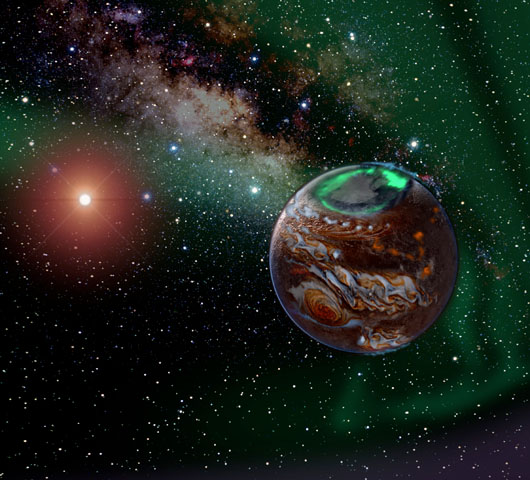Dust, volcanoes and the ignition of life

Other Worlds © 2010 Karen Teramura, all rights reserved.
Atmospheric dust is not only known to wreak havoc with travel, but charged dust clouds can also lead to lightning which might have been instrumental in igniting life on Earth or other planets.
A new study, led by astronomer Dr Chistiane Helling of the University of St Andrews and funded by EUR 1.5m from the European Research Council (ERC), is to examine the importance of dust on the climate, travel and even the origin of life.
Dr Helling, a SUPA Advanced Research Fellow, commented, “As we have recently witnessed, volcano plumes can massively influence the climate and air travel. Dust however is common not only on Earth. On Mars, copious amounts of surface dust can block both solar energy and the wheels of space exploration vehicles.”
Dr Helling’s study will examine the conditions under which dust forms. She is particularly keen on studying the physics and chemistry of Brown Dwarfs (objects that share some properties with planets, but others with stars) and gas-giant planets, which similarly form dust clouds in their atmosphere. These clouds are made of a mix of ruby, sapphire and silicates, as the atmospheric compositions in giant gas planets and Brown Dwarfs differ considerably from that on Earth. Dr Helling and her team predict gemstone-rain in these extrasolar objects in contrast to water rain on Earth.
Using the ERC funding, Dr Helling’s team will also investigate dusty plasma in volcanoes and on Mars, linking the fields of astrophysics, geophysics and plasma physics. The project will determine the processes that can charge dust clouds, and eventually cause lightning.
Dr Helling continued, “There won’t be any dust without turbulence. Dust forms in Brown Dwarfs much in the same way that clouds form on Earth, ultimately causing rain and lightning.
“It has been suggested that lightning may have triggered the occurrence of life on Earth. We may not be able to get to the bottom of this question, but we will certainly learn what role dust played in the process.”
ENDS
Issued by the Press Office, University of St Andrews
Contact Gayle Cook, Senior Communications Manager on 01334 467227 / 462529, mobile 07900 050 103, or email [email protected]
Ref: Dust 200910
View the latest University press releases at www.st-andrews.ac.uk
Category University news